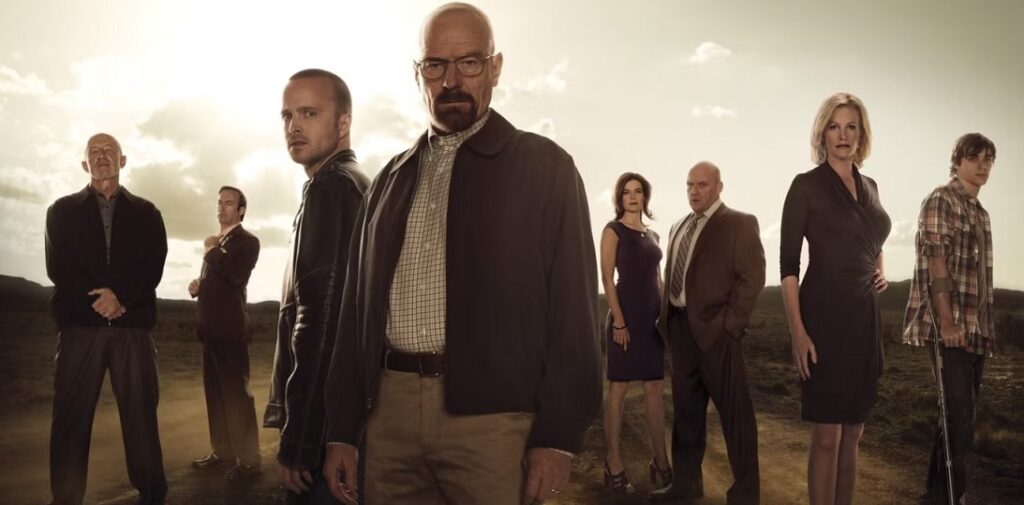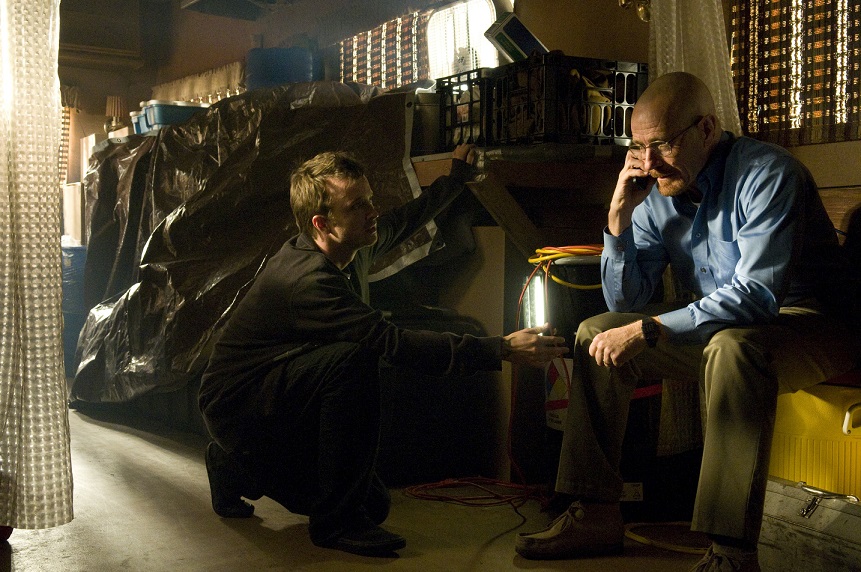
When does Breaking Bad get good?
Most fans of the show comment that Breaking Bad should be an instant attention grabber, but many will offer that it can take 3-4 episodes before the show’s hooks will capture a new viewer’s full attention. The pacing continues to escalate as the series continues throughout its five seasons until a thrilling climax.
What Fans Say:
—
—
Fans of Breaking Bad often praise it as one of television’s greatest achievements, highlighting its brilliant storytelling, unpredictable plot twists, and character development. Walter White’s transformation from a mild-mannered high school chemistry teacher to a ruthless drug lord is viewed as one of the most compelling character arcs in TV history. Fans love the show’s dark, gritty tone and the high stakes that build with each season. The cinematography and inventive visual storytelling, including memorable shots and symbolism, also earn high praise. The show’s blend of intense drama, dark humor, and philosophical undertones keeps fans riveted from start to finish.
What Haters Say:
While Breaking Bad has received widespread acclaim, some viewers find it difficult to connect with due to its heavy themes and morally complex characters. Some critics have cited the show’s slow pacing in the initial episodes as a potential turn-off for new viewers. Others are uncomfortable with the moral ambiguity that grows as the series progresses, particularly as Walter White becomes increasingly ruthless. A few detractors argue that the show’s graphic violence and intense situations make it challenging to watch, while others feel that some plot developments stretch believability.
Does Breaking Bad Fall Off in Quality?
Most fans of the show argue that Breaking Bad doesn’t ever lose steam through the finale and argue that the entire series is like a freight train, building up to an exciting and tense climax.
Aggregated Critic Commentary:
| Season | Rotten Tomatoes (Critic) | Rotten Tomatoes (Audience) | IMDb Rating |
|---|---|---|---|
| 1 | 86% | 95% | 8.8 |
| 2 | 97% | 97% | 9.0 |
| 3 | 100% | 98% | 9.3 |
| 4 | 100% | 99% | 9.5 |
| 5 | 100% | 98% | 9.5 |
These ratings reflect Breaking Bad’s consistently high praise from both critics and audiences across its run. The progression shows the show’s improvement in reception, with perfect critical scores in later seasons as the narrative intensified. The final two seasons, in particular, are celebrated for masterful storytelling, pacing, and character arcs that culminate in a satisfying and intense conclusion
Breaking Bad has been lauded by critics as a groundbreaking series that pushed the boundaries of television drama. Many critics consider it one of the finest TV shows ever, with creator Vince Gilligan’s storytelling and Bryan Cranston’s performance as Walter White receiving particular praise. The series was praised for maintaining its quality and intensity across five seasons, an accomplishment that few shows achieve. The show’s exploration of moral decay, the consequences of ambition, and the ethical gray areas of human nature were seen as not only entertaining but deeply thought-provoking. The show’s final season, in particular, earned widespread acclaim for delivering a satisfying and meticulously crafted conclusion.
Overview of Breaking Bad:
Breaking Bad, created by Vince Gilligan, premiered on AMC in 2008 and ran for five seasons, concluding in 2013. Set in Albuquerque, New Mexico, the show follows Walter White (played by Bryan Cranston), a high school chemistry teacher who turns to cooking methamphetamine after being diagnosed with terminal lung cancer. Faced with mounting medical bills and a desire to secure his family’s financial future, Walter partners with former student Jesse Pinkman (played by Aaron Paul) to enter the drug trade. What begins as a desperate attempt to provide for his family soon spirals into a dark journey of ambition, corruption, and moral decay.
Throughout the series, Walter’s evolution from a sympathetic character to a morally compromised antihero is portrayed with remarkable depth and nuance. Each season introduces new challenges, adversaries, and ethical dilemmas, pushing Walter further into the criminal underworld. The show’s tension and suspense build as Walter tries to balance his double life while evading law enforcement, rival drug dealers, and his own family’s suspicions.
Breaking Bad is celebrated for its meticulous attention to detail, with carefully crafted visual storytelling and symbolism woven into each episode. The cinematography captures the stark beauty of the New Mexican landscape, while the writing delves into themes of identity, morality, and the American dream. Walter White’s infamous alias, “Heisenberg,” becomes a symbol of his transformation and the lengths he’s willing to go to protect his empire.
Aided by strong performances from the entire cast, including Aaron Paul, Anna Gunn, and Giancarlo Esposito, Breaking Bad quickly gained a dedicated following. By its final season, it had established itself as a cultural phenomenon, inspiring countless analyses and discussions on its moral implications and character arcs. The series is often cited as a high watermark for television, and its impact on pop culture remains significant today.
Season-by-Season Breakdown:
Season 1: The Beginning
The first season introduces Walter White’s tragic circumstances and his initial foray into the meth business. Viewers witness a man on the brink of despair, struggling with his diagnosis and financial hardship. Partnering with former student Jesse Pinkman, Walter uses his chemistry expertise to create high-quality meth. The season establishes the primary tension of the show: Walter’s secret life as a drug manufacturer, his deteriorating health, and his escalating ethical compromises. With only seven episodes, Season 1 sets the stage for the moral descent that defines the series.
Season 2: Building Tension
Season 2 sees Walter and Jesse dealing with the unintended consequences of their actions as they expand their operation. The stakes are higher, with the introduction of Tuco Salamanca, a volatile drug distributor, who puts both characters in mortal danger. The season is notable for its careful foreshadowing, especially with the ominous flash-forwards involving a plane crash. The narrative complexity deepens as Walter’s wife, Skyler, grows suspicious of his behavior, pushing Walter further into secrecy. Season 2 explores the chaos that follows Walter’s ambitions and foreshadows his growing ruthlessness.
Season 3: Expansion and Conflict

In Season 3, Walter’s meth business attracts the attention of Gus Fring, a powerful and calculated drug kingpin. Under Gus’s mentorship, Walter’s operation becomes more professional, but tensions with Jesse and Skyler’s increasing knowledge of Walter’s secret life add to the drama. The season is also marked by Jesse’s personal struggles with guilt and addiction. The introduction of the Mexican cartel’s assassins, “The Cousins,” adds to the sense of danger, while Walter’s confrontations with Gus highlight his descent into the criminal world.
Season 4: War with Gus Fring
Season 4 is dominated by the escalating power struggle between Walter and Gus Fring, one of the show’s most memorable adversaries. The stakes reach new heights as Walter realizes that Gus is willing to kill him and Jesse to protect his empire. This season is a high point in the series for suspense, with Walt’s ingenuity on full display as he devises a plan to outmaneuver Gus. The climax, which involves a carefully orchestrated explosion, is considered one of the most thrilling moments in TV history. By the end, Walter has fully embraced his role as “Heisenberg,” setting the stage for the show’s final season.
Season 5: The Final Descent
The final season chronicles Walter’s full transformation into a ruthless kingpin. With Gus out of the picture, Walter builds his own empire, but his greed and paranoia drive him to make increasingly dangerous decisions. As his criminal activities unravel, Walter faces repercussions from law enforcement, his family, and his former allies. Jesse becomes a tragic figure, struggling under the weight of guilt and trauma, while Hank, Walter’s brother-in-law and a DEA agent, uncovers Walter’s true identity. The series concludes with a powerful and dramatic resolution, as Walter’s empire collapses and he faces the consequences of his actions. Season 5 offers a fitting and emotionally charged end to a complex and morally ambiguous story.
Similar Shows:
- The Sopranos
- Ozark
- The Shield
- Sons of Anarchy
- Boardwalk Empire
If You Liked These, You’ll Like “Breaking Bad”:
- Better Call Saul – A prequel that delves into the life of Saul Goodman, exploring the morally gray characters that populate Breaking Bad.
- Narcos – A dramatized account of the rise of the cocaine trade, with themes of power, violence, and ambition.
- True Detective – Known for its dark, gritty storytelling and complex characters, similar to Breaking Bad’s tone.
- Fargo – Although tonally different, Fargo shares Breaking Bad‘s unique blend of suspense, dark humor, and moral complexity.